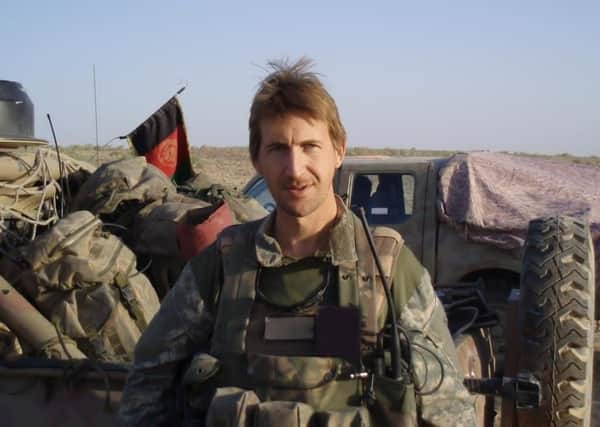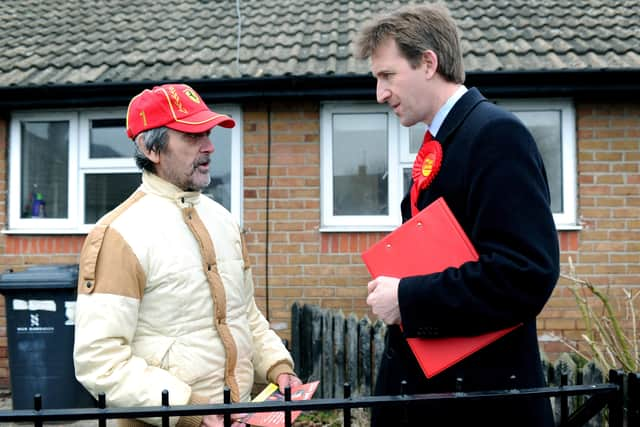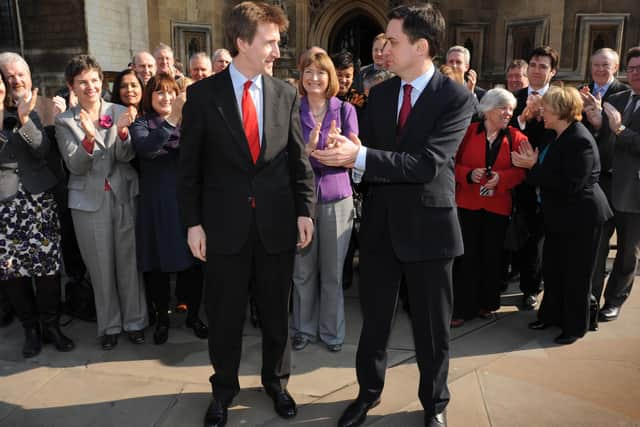Dan Jarvis on grief, war and why his children won’t be reading his book until they are 18


Dan Jarvis was in his final few months of officer training at Sandhurst when he was introduced to the concept of the ‘coping box’.
Back on that day in June 1997, a colour sergeant explained to Jarvis – now Barnsley Central MP and Mayor of the Sheffield City Region – and his peers that during a difficult operation, he would mentally store all his immediate worries and troubles away.
Advertisement
Hide AdAdvertisement
Hide Ad“When your mates are being killed and maimed, you don’t have time to grieve, don’t have time to think too deeply about what’s happening,” they were told in a story Jarvis recounts in his autobiography Long Way Home. “You just have to get on with it. Better to store it all away in that box, and deal with it later. When you get back, maybe then you can open it up and deal with it.”


It was advice Jarvis took to heart as his service in the Parachute Regiment took him on challenging deployments to Kosovo, Iraq and Afghanistan, rising to the rank of major and even having a $50,000 bounty put on his head by the Taliban in the process.
But he now admits that process of repressing challenging emotions continued after he left the military to embark on a political career months after his wife Caroline had tragically died of cancer in July 2010. He moved with his two young children from their home in Salisbury to start a new life in Yorkshire after winning a by-election to become Labour MP for Barnsley Central in March 2011.
In Long Way Home Jarvis talks of using work “as a hole to hide in” during the awful progress of Caroline’s cancer and speaking to me over the phone on his 48th birthday last week, he admits that his whirlwind journey to Parliament could also fall into that category.
Advertisement
Hide AdAdvertisement
Hide Ad“This book is me opening my coping box,” he says. “I bounced very quickly from bereavement and being in the Army to overnight doing something completely different. I was fortunate be have this amazing, challenging opportunity and I could focus my efforts on it. But the truth is that delayed the process of really coming to terms with what had happened.


“In the first five years of being in Parliament, you are run ragged learning how to be an MP. It was only when I got the measure of that when I had the time and space to go back to what happened before. I wish I had done it sooner.”
Not only was Jarvis learning the political ropes after his election in Barnsley, he was also in the tentative stages of a new relationship. He subsequently married graphic designer Rachel in 2013 and the couple had a daughter together.
He says: “Rachel and my whole family have been very supportive of the book. She is very proud of the book and has been incredibly supportive throughout the whole process. She didn’t read it until it was published but has given me some really constructive feedback about some particular paragraphs which I’m incorporating into the paperback version.”
Advertisement
Hide AdAdvertisement
Hide AdIn addition to his busy family life – Jarvis declined to run for the Labour leadership in 2015 for that reason – he was also elected as the Mayor of the Sheffield City Region in 2018. It is a job he is doing for no salary and he successfully got South Yorkshire’s stalled devolution process back on track after years of often-bitter wrangling over the issue among local politicians.


He says while writing the book – a job which took five years – was a “nightmare” from a timing perspective because of his other commitments, it also proved to be highly cathartic.
“It has been really therapeutic and I feel a weight has been lifted off my shoulders. It was difficult in different respects but I am really pleased I was able to do it.”
The book was originally published in mid-March as the Covid crisis was unfolding and his workload due to the pandemic put most promotional efforts on hold. But the finishing touches are now being put to a paperback version, due to be published next June.
Advertisement
Hide AdAdvertisement
Hide AdLong Way Home opens with Jarvis, the son of a college lecturer and a probation officer who grew up in Nottingham and went to a comprehensive (albeit one among the nation’s best state schools), arriving at Sandhurst and immediately feeling out of place in his Marks & Spencer suit in comparison to the “made-to-measure pin-stripe suits or aristocratic-looking tweed jackets” of most of his peers.


Jarvis reflects on the military bias towards “the right sort of chap” which continues to see the upper ranks dominated by those who attended private schools but also celebrates a general ethos and outlook which he says in the book are seen much less in the world of politics.
“I had come to understand why the core values of courage, discipline, self-commitment, integrity, respect and loyalty really mattered,” he writes. “They weren’t just words, old-fashioned notions, but concepts to live your life by. I believed it then. I believe it now. Indeed, these days, as I become more experienced in a different form of public service – that of politics – I wish that all public servants lived by such a creed.
“We have Nolan’s ‘Seven Principles of Public Life’ – Selflessness, Integrity, Objectivity, Accountability, Openness, Honesty and Leadership – but from my experience in politics, they are, too often, just words, and, to our collective shame, rarely lived by.”
Advertisement
Hide AdAdvertisement
Hide AdJarvis says while some aspects of military life - particularly on the organisational front - are good preparation for politics, it can sometimes be harder to assess someone’s true motives in his new career.
“Politics is played out in the public domain and sometimes you get criticism from people you thought were on your side.
“We did what we did in Afghanistan under the cloak of anonymity. In politics, there is the spotlight of public scrutiny and you have to accept that whatever you do, people will criticise you.”
One of the most frequently-aired criticisms of Jarvis is that holding the twin jobs of MP and Mayor means he is unable to give either role his full attention - a claim he takes umbrage at.
Advertisement
Hide AdAdvertisement
Hide Ad“It is not meant to sound glib but everybody has benefited from me doing the two jobs apart from my family and myself. We didn’t have a devolution agreement in 2017 and we had a very dysfunctional arrangement.
“I have always said this is not a long-term arrangement to do both things. People who say it should be full-time are never able to explain what that means for Government ministers. I have done all of this for nothing.
“What the pandemic has shown more than anything is the huge importance of giving resources and powers to democratically-elected mayors who understand the challenges and opportunities in their areas. It also exposes the urgent need to level up the north of England. The brutal truth is Covid is levelling down the North. The Government will need to go much further than the spending review did otherwise you are just tinkering at the margins.”
Jarvis got an early taste of how the world of military and political power intersected during the Kosovan conflict, where he was made the aide-de-camp - or personal staff officer – of General Mike Jackson, one of the nation’s most high-profile generals. Jarvis writes Jackson had a fearsome reputation among soldiers for not suffering fools gladly and a nickname of ‘The Prince of Darkness’ for his famed ability to attend social events into the very early hours before going straight into the office to begin the next’s day work.
Advertisement
Hide AdAdvertisement
Hide AdIn his role, Jarvis saw Jackson meet with the likes of Tony Blair and Bill Clinton on a regular basis as leading politicians flew into Kosovo to be updated on military progress.
“I learned a huge amount from having a ringside seat at these political-military deliberations, getting to understand the process which led to decisions being made,” he writes.
It was through his role as Jackson’s aide-de-camp that he met Caroline in 2000, when she was working as the general’s chef in the UK.
The couple married in December 2001 and their first child was born in February 2003 shortly before Jarvis was deployed to Iraq, where an 18-year-old in his battalion was among those killed during the efforts to liberate the country from Saddam Hussein.
Advertisement
Hide AdAdvertisement
Hide AdJarvis writes that despite that tragedy, when he left Iraq in May 2003 he was hopeful for its future but it soon became clear that feeling was misplaced as the country descended into chaos.
“Two years later I picked up a newspaper which on its front page ran a story about the hundred British soldiers who had so far been killed in Iraq. This front page consisted of one hundred pictures of the fallen soldiers,” he writes. “I scanned across them. Included was Matt Bacon, who had been a good friend from Sandhurst. I counted nine more I had known reasonably well. Ten per cent – what a terrible game of ghosts this had become.
“That was the moment I stopped counting.”
He returned to Iraq in October 2004 and says by that stage “it was truly shocking how dangerous the country had become” as Al-Qaeda flooded into Iraq.
Jarvis reflects in the book: “There can now be no doubt that the intervention, although successful in removing a bloody dictator, also unleashed a range of forces which were unforeseen and have undoubtedly led to greater instability not just in Iraq but across the wider Middle East, and further afield. Looked at in that context, and remembering the hundreds of thousands of Iraqis who have lost their lives, it’s impossible not to conclude that it was a grave error.
Advertisement
Hide AdAdvertisement
Hide Ad“That our soldiers, including some of my friends, might have died in vain is something I still wrestle with. They lost their lives nobly serving our country, and their families can be proud of them and their service. But I cannot look them in the eyes and justify it when they ask me (as they have) whether their ultimate sacrifice was worth it, because for them I know that it won’t have been.”
While the military situation was challenging, Jarvis’s contented home life was added to by the birth of his second child in late 2004. But in April 2006, the family received the shattering news that Caroline had bowel cancer and told 50 per cent of people with the same condition do not survive for more than five years.
Jarvis writes that while the pair tried to stay “ruthlessly positive”, they started seeing less of their friends and life became about survival rather than enjoyment.
He says his own way of coping with the situation was to embark on “longer and longer punishing runs over the hills to burn off the anguish”.
Advertisement
Hide AdAdvertisement
Hide Ad“In the driving sleet, or whatever the weather, mile after mile, I would run myself nearly into the ground and return physically exhausted and caked in mud. This helped a bit – exercise always does – but there was no real escape from it.”
Jarvis initially took a job training new recruits so he could be at home more but in spring 2007 he was offered a six-month posting in command of a task force in Helmand training Afghan soldiers.
With Caroline’s cancer in remission at the point but the future very uncertain, Jarvis says he agonised over the decision but accepted on the back of her being “adamant” that he shouldn’t miss the opportunity.
But soon after he accepted the job, her cancer returned and she needed an operation to remove her ovaries. Jarvis says the situation made her “even more adamant” that he should go despite her facing a challenging recovery period. But Jarvis writes it was ultimately his call and says leaving home on the day of his departure “was the hardest thing I’d ever had to do”.
Advertisement
Hide AdAdvertisement
Hide AdJarvis talks in the book about the often-challenging task of training the Afghan forces and working out who to trust - as well as finding out that the Taliban had put a price on his head.
“I had been told that the Taliban had apparently placed a $50,000 bounty on me, either for my capture or for my head,” he recounts. “My initial reaction was: good – that showed what we were doing must be having an effect. It wasn’t a huge amount of money, but looked at in the context of Afghanistan it was a king’s ransom. It would have been enough for any Afghan to immediately retire and not only never have to worry about money again but to live in relative luxury.
“Under those circumstances, who could say for certain that one of our Afghans wouldn’t betray us? Although I wasn’t initially too concerned about this personal threat, the more I thought about it, the more it undermined my morale.”
Jarvis also reveals how the stress of the situation led him to develop superstitious rituals, such as repeating to himself every morning ‘None of us will die today, none of us will die today’ and then in the evening saying ‘None of us died today, none of us died today’.
Advertisement
Hide AdAdvertisement
Hide AdHe also developed a habit of carrying a green handkerchief given to him as a present by Caroline wherever he went.
In the book he recounts how he left it behind on one operation to find a key transit hub of the Taliban.
After his vehicle broke down, a mix up with the night-time recovery work meant his convoy accidentally drove off without him, leaving him stranded in enemy territory with no transport and no working radio.
“I swore repeatedly and told myself that this would never have happened if I hadn’t left my bloody green hanky behind,” he writes in the book, going on to explain his hair-raising hour-long solo walk to the relative safety of a British camp.
Advertisement
Hide AdAdvertisement
Hide AdReflecting on the incident now, Jarvis says: “I still have the green hanky. I’m not a superstitious person but in that situation when you are tired and stressed and run down, you will cling to any comfort that helps you get through the hour, the day, the week. It was a bit of a comfort blanket but it assumed all kinds of mystical properties in my head.
“There is going to be a paperback version next year and I laughed out loud when I read the bit back about the hanky. While I don’t retain any superstitions I do retain the old habits. I’m a tidy freak and everything has to be clean and tidy. But I do quite often still have the green hanky with me.”
In April 2008, a few months after Jarvis had returned from Afghanistan, Caroline was told her cancer had returned yet again.
Jarvis’ book unsparingly describes the punishing impact of chemotherapy and the gradual decline of Caroline’s health, including the terrible moment of realisation when doctors decided she needed a permanent oxygen supply at home.
Advertisement
Hide AdAdvertisement
Hide Ad“From that moment on it was literally impossible to pretend that we had anything resembling a normal life,” he writes. “Impossible to pretend that we weren’t up against it. Impossible to pretend that this wasn’t a horrible situation to be in.”
He writes that the situation was so bleak he was “unable to shove it all away in my coping box” and found it impossible to think of the future while burying himself in a combination of his caring responsibilities and his work on developing new Army training policy.
In a particularly moving chapter, he writes about Caroline’s last smile in the weeks before her death after a mole unexpectedly popped up in their rose bed, as well as his final hours with her before she passed away in hospital.
“I had no idea what to do,” he writes of the moments after her death. “I went outside for a moment and had a quiet cry. ‘It’s not fair, it’s not fair,’ I could hear myself saying. For a moment I was just lost in the sadness of it. Then I had the strangest of experiences, where it felt like I was looking down on myself – a spectator watching this horrible nightmare play out.”
Advertisement
Hide AdAdvertisement
Hide AdHe also describes the heart-wrenching experience leaving the hospital – the same place where both their children had been born – without his wife.
“I was holding a small plastic bag containing Caroline’s belongings – her dressing gown and a washbag I’d made up with a few toiletries. I’d arrived at the hospital with my wife, I was leaving with a plastic bag.”
Jarvis goes on to write about the awful process of trying to pick up the pieces and continue family life as a 37-year-old widower.
“Four simple words, ‘I want my mummy’, now conveyed a cataclysmic sense of loss and grief. To hear them screamed out chills the soul. On another occasion I was struggling to do my daughter’s hair. I didn’t know how to do it – Caroline had always done it. The frustration was such that I wanted to scream and cry, but I didn’t, because I didn’t want my daughter to see that I was upset.”
Advertisement
Hide AdAdvertisement
Hide AdHe describes how he employed military tactics to get through his darkest moments - “Try and hold things together in the heat of the moment, work through the tough times, keep going, try and stay cheerful, never give up, and when you can, work out what you’re going to do and then get on and do it. Simple. Well, maybe not always”.
He says he was “incredible fortunate” to meet Rachel following the tragedy of bereavement as he rebuilt his life.
Ten years on and now with a new life in Yorkshire and the public eye, Jarvis says going back over such a dark period in his life was both challenging but necessary.
“It was very hard to go through the process of reliving the pain and heartache of it all. It was emotionally exhausting but I feel better for doing it. There are parts of this book that are pretty bleak but I have tried to do it in a way that is constructive and says whatever you are going through, you can get through it. It is not an easy read in places but there is what I hope is a really positive message at the end.”
Children will only read his book at 18
Advertisement
Hide AdAdvertisement
Hide AdDan Jarvis says while his children were supportive of him doing the book, they are yet to read it because of the tough subject matter.
“I have got three books at home, one for each of the children when they reach 18. That was always the deal,” he explains.
“My kids were supportive of me doing it but we agreed they would not read it until they are 18. I just thought that would be the point where they would have sufficient maturity to be able to engage with it.
“I was always clear from day one there was only a point in doing this if it was going to be brutally honest – the reader sniffs out if you are not being entirely truthful.”
Advertisement
Hide AdAdvertisement
Hide AdLong Way Home by Dan Jarvis published by Little, Brown is out now in hardback. RRP £18.99
Support The Yorkshire Post and become a subscriber today. Your subscription will help us to continue to bring quality news to the people of Yorkshire. In return, you’ll see fewer ads on site, get free access to our app and receive exclusive members-only offers. Click here to subscribe.
Comment Guidelines
National World encourages reader discussion on our stories. User feedback, insights and back-and-forth exchanges add a rich layer of context to reporting. Please review our Community Guidelines before commenting.